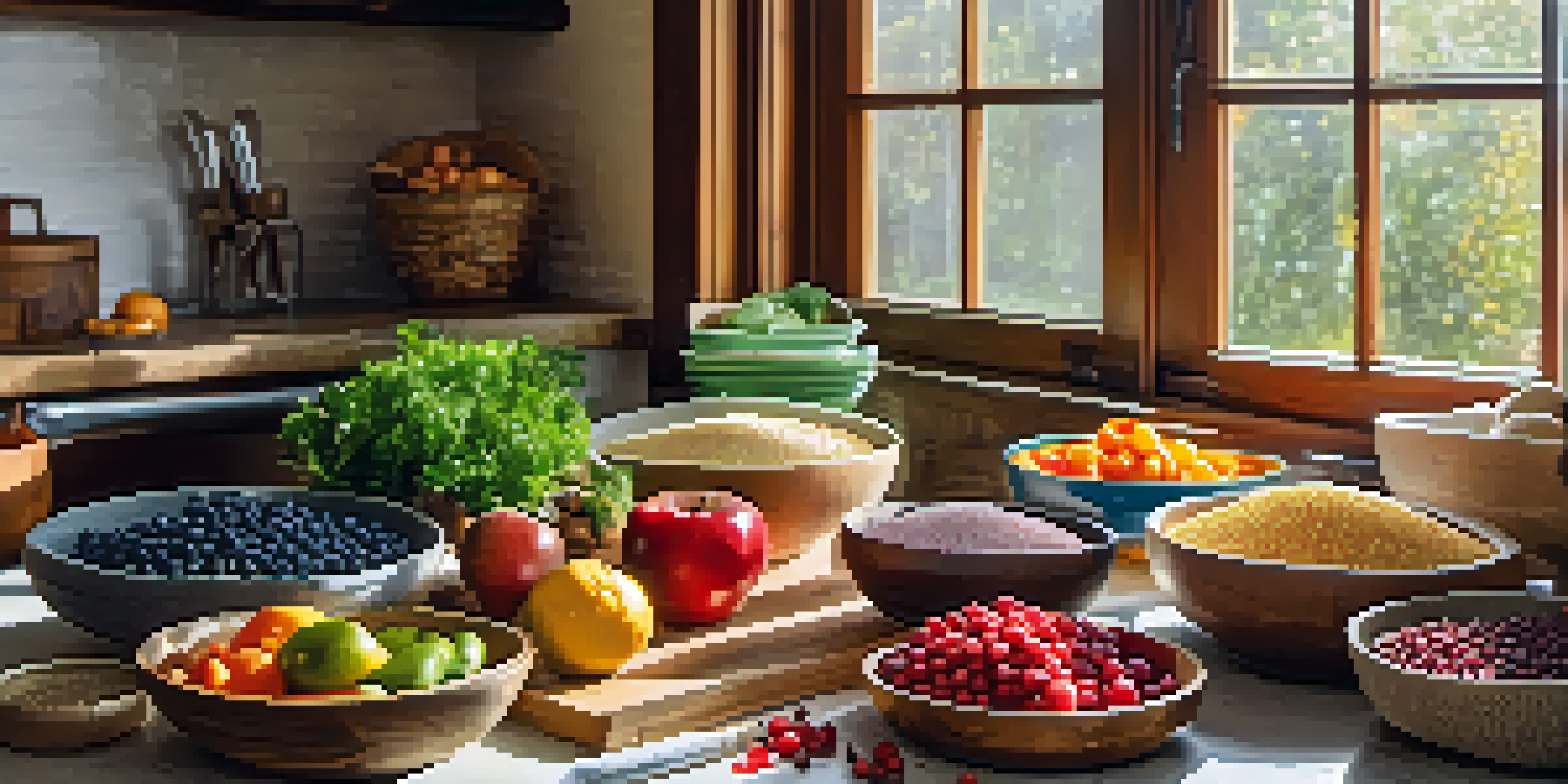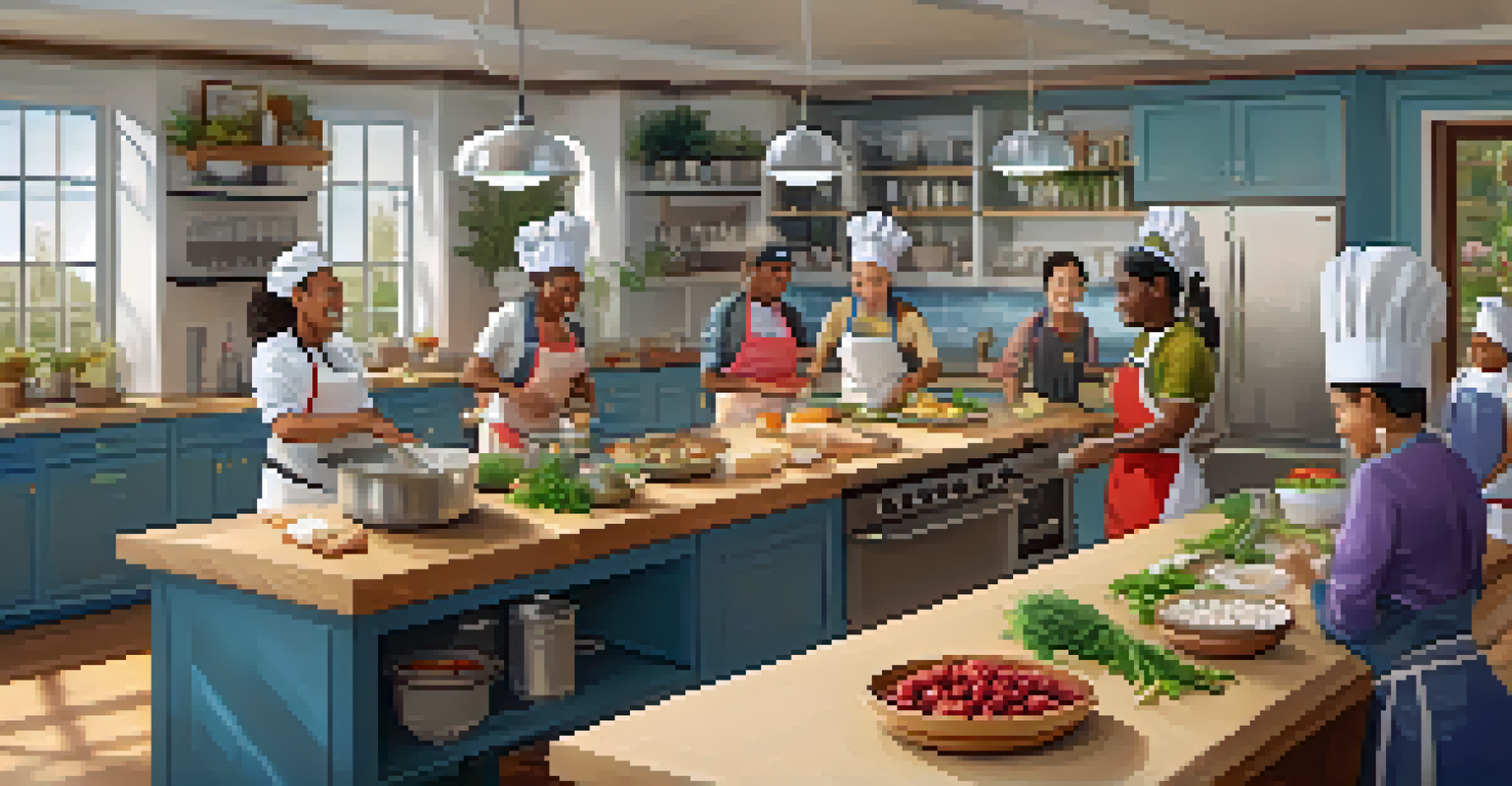The Role of Culinary Medicine in Managing Food Allergies

Understanding Food Allergies and Their Impact
Food allergies can be life-altering, affecting daily life and nutrition. They occur when the immune system mistakenly identifies a harmless food as a threat, leading to symptoms ranging from mild hives to severe anaphylaxis. This unpredictability makes managing food allergies a priority for those affected.
Food allergies are not just a medical condition; they can impact every aspect of life, from social interactions to meal preparation.
The emotional and psychological toll of food allergies can be significant. Individuals may experience anxiety about eating out, social gatherings, or even preparing meals at home. As a result, understanding and managing these allergies is crucial for maintaining overall well-being.
Culinary medicine offers a unique approach to addressing food allergies by combining the principles of nutrition with culinary skills. This integration allows individuals to enjoy meals that are both safe and delicious, empowering them to take control of their dietary choices.
What is Culinary Medicine?
Culinary medicine is an emerging field that blends the art of cooking with nutrition science. It focuses on teaching individuals how to prepare healthy, balanced meals that meet their dietary needs, whether for allergies, chronic diseases, or general wellness. By emphasizing whole foods and mindful eating, it encourages a holistic approach to health.

At its core, culinary medicine aims to enhance the eating experience while promoting health. It provides practical cooking techniques and nutritional knowledge that empower individuals to make informed food choices. This is particularly beneficial for those managing food allergies, as it allows for creativity in meal preparation without compromising safety.
Food Allergies Impact Daily Life
Food allergies can significantly affect daily activities, requiring careful management to ensure safety and well-being.
By incorporating culinary medicine into their lives, individuals can gain confidence in their cooking abilities. This newfound skillset not only helps in creating safe meals but also fosters a deeper appreciation for healthy food, making the journey of managing food allergies more enjoyable.
The Importance of Meal Planning
Meal planning is a vital tool for anyone managing food allergies. It allows individuals to avoid allergens by preparing meals in advance and ensures they have safe, nutritious options readily available. This proactive approach minimizes the risk of accidental exposure and reduces stress related to last-minute meal decisions.
Cooking is like love; it should be entered into with abandon or not at all.
A well-thought-out meal plan can also promote a balanced diet, incorporating variety and essential nutrients. By including a range of foods that are safe to eat, individuals can enjoy diverse flavors and textures while supporting their health. This variety can help prevent dietary monotony, which is common among those with food allergies.
In culinary medicine, meal planning often involves learning how to substitute allergens with safe alternatives. For instance, if someone is allergic to dairy, they can explore plant-based substitutes that provide similar nutritional benefits. This strategy not only ensures safety but also opens up new culinary possibilities.
Developing Cooking Skills for Safety
Acquiring cooking skills is essential for those navigating food allergies. Knowing how to prepare meals from scratch reduces reliance on packaged foods, which often contain hidden allergens. Culinary medicine emphasizes hands-on learning, enabling individuals to build confidence in their cooking abilities.
Basic skills such as reading food labels, understanding cross-contamination, and proper food storage are crucial. Culinary medicine programs often teach these competencies, empowering individuals to create safe meals in their own kitchens. This knowledge becomes a powerful defense against accidental allergic reactions.
Culinary Medicine Empowers Choices
Culinary medicine combines nutrition and cooking skills, helping individuals with food allergies create safe and enjoyable meals.
Moreover, cooking skills can enhance creativity in the kitchen. Individuals can experiment with safe ingredients, trying new recipes that cater to their dietary needs. This creativity not only makes meal preparation more enjoyable but also fosters a sense of accomplishment in managing food allergies.
Exploring Allergen-Free Ingredients
Culinary medicine encourages the exploration of allergen-free ingredients, providing a wealth of alternatives for those with food allergies. For instance, gluten-free grains like quinoa or rice can replace traditional wheat products, offering both nutrition and flavor. Discovering these substitutes can transform how individuals approach meal preparation.
Using allergen-free ingredients can lead to exciting culinary discoveries. Many fruits, vegetables, nuts, and seeds can be incorporated into dishes, creating vibrant, flavorful meals without compromising safety. This exploration can help individuals expand their culinary repertoire, making cooking a fun and engaging activity.
Additionally, learning about allergen-free ingredients promotes awareness of food choices. Individuals become more informed about what they’re putting into their bodies, leading to healthier eating habits overall. This empowerment is a key principle of culinary medicine, fostering a proactive approach to managing food allergies.
Building a Supportive Community
Navigating food allergies can sometimes feel isolating, but building a supportive community can make a significant difference. Connecting with others who understand the challenges of food allergies can provide emotional support and practical advice for managing dietary restrictions. Culinary medicine often emphasizes community engagement as part of its approach.
Support groups, cooking classes, or online forums can serve as valuable resources for sharing experiences and recipes. These platforms allow individuals to exchange tips on safe cooking practices and discover new allergen-free recipes together. This sense of camaraderie can alleviate the stress and fears associated with food allergies.
Community Support is Essential
Building a supportive community enhances the experience of managing food allergies, providing emotional support and shared resources.
Moreover, community involvement can foster a sense of belonging. Whether it's participating in potlucks or cooking demonstrations, sharing meals with others who respect dietary restrictions creates an inclusive environment. This support network not only improves meal experiences but can also enhance mental well-being.
The Future of Culinary Medicine and Food Allergies
As culinary medicine continues to evolve, its role in managing food allergies will likely expand. Research is ongoing into how culinary practices can improve health outcomes for those with food sensitivities. This evolution could lead to more tailored programs that address individual needs, making culinary medicine even more effective.
Technology also plays a pivotal role in this future. Apps and online resources can help individuals track allergens, plan meals, and discover new recipes that cater to specific dietary needs. As these tools become more accessible, managing food allergies may become less daunting for many.

Ultimately, the future of culinary medicine aims to empower individuals with the knowledge and skills necessary to live healthily and safely with food allergies. By combining culinary arts with nutritional science, it offers a promising path toward improving the quality of life for those affected by food allergies.